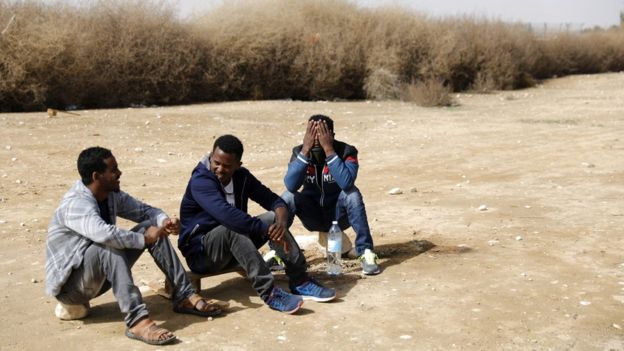Israel has scrapped a plan to forcibly deport tens of thousands of illegal African migrants.
In a written response to the country's Supreme Court, the government said forced removal of the migrants "is no longer on the agenda".
However, Israel's immigration authorities are still seeking ways to deport migrants voluntarily, it said.
The fate of Israel's roughly 30,000 illegal African migrants has become a hugely contentious issue.
The supreme court previously suspended a plan to expel the migrants - mostly from Eritrea and Sudan - unless they voluntarily accepted a cash lump sum and a plane ticket out of the country.
Prime Minister Benjamin Netanyahu then cancelled a UN deal to resettle the migrants in Western nations.
Under the deal, Israel would give "temporary residence" to a migrant in Israel for each migrant resettled abroad.
On Monday, 18 Democratic members of the US House of Representatives reportedly wrote to Mr Netanyahu saying they were "dismayed" and "disappointed" that he had dropped the UN proposal, saying it left the migrants "in limbo, with no clear next step".

Where are the migrants from?
Most of the African migrants in Israel are from Eritrea - a one-party state whose leaders have been accused of crimes against humanity by a UN inquiry - and war-torn Sudan.
They say they fled danger at home and that it is not safe to return to another African country, but Israel considers the majority of African asylum seekers to be economic migrants.
Most of them entered from Egypt several years ago, before a new fence was built along the desert border. This has ended most illegal crossings.

How controversial is this issue?
A decision in January to offer the migrants a cash lump-sum and a plane ticket to leave Israel voluntarily or otherwise face forced expulsion has been criticised in Israel.
Some critics in the country and among the Jewish community abroad - including former ambassadors and Holocaust survivors - said the plan was unethical and a stain on Israel's international image. The UN refugee agency said it violated local and international laws, and large protests were held in Israel.
Mr Netanyahu said the opposition was "baseless and absurd" and that Israel would resettle "genuine refugees".
Activists, however, noted that only a handful of Eritreans and Sudanese had been recognised as refugees by Israel since the country took over the processing of applications from the UN in 2009.
Latest Stories
-
Biden takes aim at ‘tech industrial complex’ in farewell speech
13 minutes -
Biden says Gaza deal based on his framework while Trump claims credit
26 minutes -
JoyNews poll: Akufo-Addo, his government’s ‘killer’ taxes and nepotism blamed for NPP’s 2024 defeat
3 hours -
Malian PM arrives in Accra with special message for Mahama
3 hours -
Barca scores 5 again in Copa del Rey win over Betis
4 hours -
Harry Kane scores again as Bayern thrash Hoffenheim
4 hours -
Arsenal win North-London derby to close gap at the top
4 hours -
Djokovic breaks Federer record in Melbourne win
5 hours -
Foreign Affairs Ministry lists categories of recalled diplomatic and service passports
5 hours -
NAELP refutes defamatory claims, highlights achievements
6 hours -
2024 Election: Voter apathy caused NPP’s defeat – Justin Kodua
6 hours -
Ghanaian teacher shortlisted for GEM’s $1m global prize
6 hours -
Young entrepreneurs encouraged to capitalise on 5-year tax exemption Incentives
6 hours -
Lord Morrgan fulfils promise; gifts fan Wale new motorbike
7 hours -
CHAN 2024 Draw: Two-time Champions Morocco in Group A with hosts Kenya
7 hours

